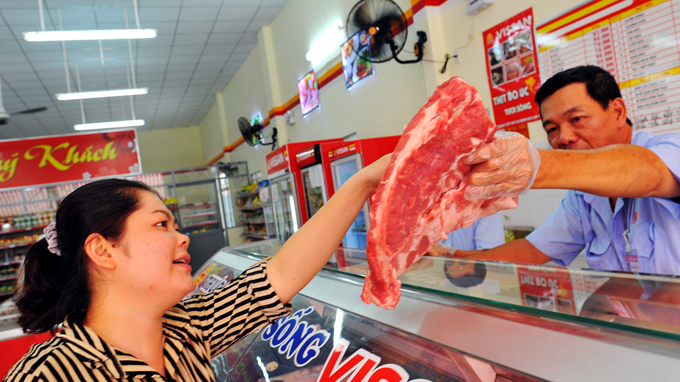Vietnamese businesses have sketched scenarios when the country joins the TPP (Trans-Pacific Partnership), and acknowledged that they may face challenges keeping the market shares against a new wave of foreign competitors.
Once Vietnam has actually become a TPP member, some 11,000 duties will be zeroed, which opens a wide door for foreign products such as Australian beef and American chicken to penetrate the domestic market.
Van Duc Muoi, director of Vissan, a leading meat processor, said joining the TPP means Vietnamese businesses can enter other markets, and vice versa.
The most important thing that should be done to protect the local market, Muoi said, is to prove that foreign competitors are not eligible to enter the country.
“In other words, more technical barriers will be set up,” he explained.
Unfortunately, Vietnam has proved incapable of passing several such barriers since it became a member of the World Trade Organization.
Vietnamese pork, beef, and chicken meats still fail to enter the US, the EU and other developed countries, who say the products do not meet standards in the regard of protecting consumer health.
Meanwhile, meat products from the US, Chile, and Australian are rampant in the country.
“In the post-TPP period, the duties for these imports will be zeroed, sending prices to much lower rates, thus exacerbating the local husbandry industry,” Muoi warned.
Meanwhile, a representative of Cau Tre, a major manufacturer of processed food, said even the current 20 percent import tax fails to prevent foreign products to enter Vietnam.
The official said he cannot feel upbeat for the future of several local food manufacturers and processors who are weak and not following a standardized production mechanism.
“TPP has strict requirements on the product tracing… Many local firms will ‘die’ as they fail to meet these regulations,” he said.
Time to change
Even the textile and garment sector, which has repeatedly posted strong growths of up to 20 percent during the last few years, admits challenges await them.
“Competitions will be harsh, especially if businesses do not seek alternative plans right now,” said Lam Quang Thai, brand director of BlueExchange.
The Vietnamese textile and garment sector only focuses on exports, leaving the home soil for foreign competitors, especially the Chinese companies.
Thai said the local products fail to have competitive prices as the manufacturers still have to heavily rely on imported materials.
Meanwhile, Nguyen Thi Thu Trang, an official from the Vietnam Chamber of Commerce and Industry, said the situation is brighter for Vietnamese fruits, as traders have adapted to the good agricultural practices.
“Many Vietnamese fruits and agricultural products have entered foreign markets and they can well take advantage of the TPP,” she said.
As for the animal husbandry industry, Muoi of Vissan said it is time for changes.
“TPP will help the industry look back and acknowledge that they have to thoroughly change and restructure in order to produce competitive products with the foreign rivals,” he said.
Vietnam has been launching a program that encourages Vietnamese to buy Vietnamese goods.
But even this will be challenged by the TPP, economic expert Pham Chi Lan warned.
She said local firms only have a few years left to change themselves.
“Should they fail to take action on time, losing the market share on home turf is inevitable,” she said.



















































